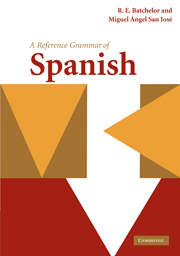Book contents
- Frontmatter
- Contents
- Preface/Prólogo
- Acknowledgments/Agradecimientos
- Abbreviations/Abreviaturas
- Introduction to the Spanish language/Introducción a la lengua española
- Part I
- Part II
- Part III
- Part IV
- Part V
- Part VI
- 60 Adjectives/Adjetivos
- 61 Adverbs/Adverbios
- Part VII
- Part VIII
- Part IX
- Part X
- Appendix I Verb tables/ Tablas de verbos
- Appendix II Glossary/Glosario
- Bibliography/Bibliografía
- General index/Índice general
- Subjunctive index/Índice del subjuntivo
60 - Adjectives/Adjetivos
from Part VI
Published online by Cambridge University Press: 05 June 2012
- Frontmatter
- Contents
- Preface/Prólogo
- Acknowledgments/Agradecimientos
- Abbreviations/Abreviaturas
- Introduction to the Spanish language/Introducción a la lengua española
- Part I
- Part II
- Part III
- Part IV
- Part V
- Part VI
- 60 Adjectives/Adjetivos
- 61 Adverbs/Adverbios
- Part VII
- Part VIII
- Part IX
- Part X
- Appendix I Verb tables/ Tablas de verbos
- Appendix II Glossary/Glosario
- Bibliography/Bibliografía
- General index/Índice general
- Subjunctive index/Índice del subjuntivo
Summary
Below is a passage illustrating the use of adjectives, how they agree with nouns, how they are apocopated, how they may occur in a very flexible order in a Spanish sentence, and how they change their meaning according to where they are located with respect to the noun. The topic narrates the life of a prosperous man, whose acquaintances in a local club include a cross section of idiosyncratic men in a small provincial town.
Él se consideraba un gran hombre porque, aunque era hijo de un hombre simple y de una simple sirvienta, había logrado un éxito notable y tenía un chalet y una casa lujosos, de grandes proporciones, un buen coche, un mal caballo, bonito, sí, pero era un peligroso rocín (horse) de mala entraña (malicious), color castaño oscuro. Por otro lado, había dado una carrera técnica a cada hijo, claro, todo gracias al gran capital que había aportado al matrimonio su habladora mujer, un poco tontiloca (silly) y con apariencias de ballena hembra (female whale).
Era un hombre satisfecho, que había sabido escalar a las más altas cotas de la sociedad en su pequeña villa provinciana, donde se juntaba en el casino con las fuerzas vivas (group of influential people): el alcalde semianalfabeto (semiliterate), un bigotudo (with a big moustache) y taciturno (moody) sargento de la guardia civil, un jovencísimo médico, recién casado, que estaba como pez fuera del agua en aquel apartado lugar y, por fin, un cura que por ciertos indicios era de ésos de la teología de la liberación y con indicios ciertos de ser algo místico.
- Type
- Chapter
- Information
- A Reference Grammar of Spanish , pp. 333 - 341Publisher: Cambridge University PressPrint publication year: 2010



